|
The Other Guys
Underdog candidates enter the political fray
This coming Tuesday, many Knox County voters will make an important choice in several local elections: between the guy they’ve heard of and the guy they haven’t heard of. For most, it won’t be a difficult decision. They’ll vote for the guy they’ve heard of.
It’s never a level playing field, of course. Via yard signs, TV ads, bumper stickers, radio spots, gossip columns, or simply by a prior career of public service, we hear much more about some candidates than their opponents. And sometimes the better-known candidate turns out to be the better-qualified one.
But because we call ourselves an “alternative” weekly, we thought that, before it’s too late, we’d offer some exposure to the ones you maybe haven’t heard of. And maybe, in the bargain, find out a little of what drives people to take on an uphill battle.
John Greene, Charles Howard
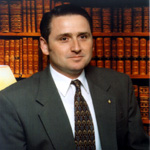
US. Representative, 2nd Congressional District
John Greene is a Democrat who defies the party stereotype, just as his political idol, Georgia Congressman Larry McDonald did before he was shot down by the Russians. Far to the right of most Republicans, McDonald went down in a blaze of irony on Korea Air Lines Flight 007 in 1983 after it got off course and violated Soviet air space. Greene used to listen to McDonald on radio shows back when the Georgian was reading litanies into the Congressional Record far into the wee hours of many Washington mornings. Greene was just a kid, but he was impressed. “He was one of the most conservative guys ever,” says Greene, a Whitwell native who lives in Chattanooga, “and I always wanted to be just like him.”
For the second straight congressional election in Jimmy Duncan’s Tennessee 2nd District, Greene’s name is on the ballot as a Democrat. Still living in the 3rd District while running in the 2nd, Greene promises he’ll move, “probably to Knoxville,” if he defeats Duncan. Never mind that Duncan seems unassailable, serving his ninth term as successor to his father in a district that hasn’t had anything but a Republican as its representative since the Civil War.
“It’s a long shot, but I think it could happen,” says Greene. “I need to round up a lot of undecided voters.” In 2002, Greene got 38,000 votes, almost 20 percent of the district total. “I got me that many votes, I’ll just run again,” he says that experience told him.
He got started, he says, because he got to thinking, “It looks like this whole country’s just going down the tubes. The danger to this country is so great, I thought, if I don’t run I don’t know who will.”
He says he got to talking with some like-minded people, and decided that Congress was the best place to serve. “We picked the House because that’s where the purse strings are,” he says.
A warehouse worker for Bi-Lo foodstores, Greene’s platform is summed up in a few sentences. “I will vote ‘no’ on any and all legislation which, in any way, increases the size, cost, power or extends the reach of government at any level. Bills that do any of these things are destructive to liberty and freedom no matter how cleverly disguised they may be,” he says. Only entitlement programs, such as Social Security or Medicare, the refuges of the working man and woman, are off limits to his “no” pledge, he says.
He’s not alone in his congressional quest, he says, though he has no organization. “It’s a grassroots thing. If you organize and raise more than $5,000, you have to comply with Federal Election Commission regulations. There are too many rules; it’s impossible to comply,” he says, “Ordinary Americans is what we call ourselves. We had 27 candidates for House seats in Tennessee at one time, but some got kicked off the ballot. Petition signatures were challenged, or some such.”
One of those candidates is Charles E. Howard of Rockwood, a truck driver who is also running in the 2nd District as an independent and remains on the Nov. 2 ballot. His wife, Debbie Jones Howard, ran as a Republican and lost to Duncan in the August primary election. Greene and the Howards are “running mates,” so to speak, with the thought of challenging incumbents from all sides and bringing attention to their message. “I talked with John Greene just briefly and got involved,” Howard says. “It was my interest in my country and my kids; I’m the father of six children. Something is terribly wrong with this country. A lot of Americans feel it, though they may not be able to put their finger on it.
“We want to get this country back on track,” Howard says. “The politicians want you to think it’s complicated. The problems are not complicated. It’s very simple. You have to know right from wrong, and you have to be able to stand up and do what’s right.”
Greene agrees. “A lot of people are upset about what’s been going on in this country. We want to offer them a solution.” His and the Howards’ solution is on the table. “Limit the size and scope of government,” they say, and the details will take care of themselves. The problem, for them, may be even simpler than they think. Jimmy Duncan is one of those details, and he’s not about to be beaten by a Democrat or an independent. It really isn’t all that complicated in the 2nd District this election season.
—Barry Henderson
Cindy McGill
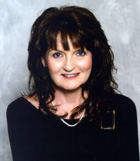
Tennessee State Senate, 6th District
Cindy McGill is an underdog in her race against Jamie Hagood for the 6th District seat of retiring Sen. Ben Atchley.
“I’m a political novice,” admits the 46-year-old realtor. She’s a newly politicized citizen who was asked by the Tennessee Democratic Party to run for the seat at the last minute, the day before petition sheets were due.
McGill’s activism started one day last autumn when she was driving to the rural, Blount County home of her mother, Mildred Cutshaw. With the top of her convertible down, she admired the fall colors and the dozens of tiny American flags that lined the road. The sight was sweet, patriotic—until she came upon the scene at a neighborhood church, where a young soldier from the war in Iraq was being buried in the cemetery.
“It hit very close to home,” McGill says. She was moved to take action. “I said, ‘I’m going to start running my mouth. And I’m going to do something about it.’”
She started out as a supporter for Wesley Clark’s presidential campaign and then John Edwards’. Those efforts put her in contact with the local Democratic Party. Originally she registered to run for the state House seat for District 14, the seat contested by Parkey Strader (R), Chris Oldham (D) and Keith P. Downen (I). But the local party head asked her to step aside for Oldham, which McGill was happy to do. Soon after, McGill received the call from the state party office about running against Hagood, who served three terms as State Representative for the 17th District.
McGill hasn’t received much financial support from the state party, which gives funds first to Democrat incumbents who are facing opposition and then to candidates it considers most viable—those who can raise a lot of money.
“I haven’t raised a lot of money. But I’ve done a lot of things. What I hope to do for the Democratic Party is to educate people on what the Democratic Party is. It’s not what most people think.”
McGill is a democrat despite her family’s “staunch Republican” leanings because of the inconsistencies she perceives in how GOP policies actually respond to middle class and working class needs. McGill doesn’t shy away from using her family’s story as a specific example of how she would change policies that affect the minimum wage, businesses abilities to outsource, health care for the working poor and educational opportunities for underprivileged children.
“We grew up very poor,” McGill says of herself and her sister, who were raised by their single mother. Cutshaw, now in her 70s, worked for 35 years at Standard Knitting Mill before the company closed the mill. Left with a pension of $67 per month, Cutshaw has worked at Wal-Mart for the past 14 years.
McGill, herself a single mother of an 11-year-old daughter, is also one of Tennessee’s uninsured. As an independent contractor, she has at times purchased her own health insurance, but rising premiums made the cost too high. And now she’s been deemed uninsurable.
“It’s a myth that people that are uninsurable are automatically taken care of through TennCare or MediCare,” she says. “No, you have to make so little money to qualify.”
As State Senator, McGill would help Gov. Bredesen continue to reform TennCare so that it assists more people, instead of fewer. She stresses that people who do have health care coverage should be just as concerned about those who don’t.
“People still get sick. If they don’t have health insurance, the burden falls back on you. Do you think the insurance companies take the loss? No, it’s passed on to you and your premiums. And that’s why so many small businesses now do not offer healthcare coverage.”
McGill also believes strongly in Project GRAD, a national non-profit program that strives to increase graduation rates at schools in economically disadvantaged communities.
Nov. 3 might mark the end of Cindy McGill’s run for State Representative, but it will be the beginning of the rest of her life.
“It’s been a defining moment in my life,” she says. “I’ve always believed that things happen for a reason, and this was kind of a fluke that happened to me for a reason. And I’m going to be able to do some good by reaching out to people. And if I do that, I’ve won. No matter what happens, I’ve won. And I’m looking forward to Nov. 3 to see where I need to go from there.”
—Paige M. Travis
Randall Parker
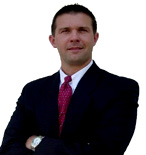
Tennessee House of Representatives, 13th District
The enthusiasm of conservative Republican Randall Parker could be described as either infectious or adorable. With a background in finance and a lifelong interest in politics, he hopes to parlay his experience and aw-shucks chutzpah into a role as a public servant.
The 31-year-old candidate is running for the Tennessee House of Representatives out of a sense of civic duty and general distaste for the ideals and actions of his opponent, Democratic incumbent Harry Tindell. Parker believes that Tindell initially represented his district well, but he’s confident that the demographic has changed.
“[My] generation has this ‘you owe it to me’ attitude that the world should bend down and serve us, and I don’t agree with that. Growing up Southern Baptist, my parents were very clear about right and wrong,” Parker says. “With that kind of an upbringing, for me to find myself living in Harry Tindell’s district was painful. Someone that’s pro-gay marriage, pro-abortion, pro-income tax, pro-every tax...”
However, Parker is particularly complimentary towards Tim Burchett and Jamie Hagood. “They’re just old-fashioned Tennesseans who do what they feel is right for the state, and they keep their own districts in mind first,” Parker says. “To look around to see people like that, and find Harry Tindell sitting in the middle of really good people is hard.”
Parker says he’s empathetic to the plight of the common man, steadfast in his stance on reducing taxes across the board. “If I can’t pick [voters] up on the social issues, what about Mom and Pop that are out there struggling because of these taxes Harry’s passed on? What about the single mother that he wants to pay an income tax?” Parker says. The ultra-conservative challenger firmly believes there are enough people of like mind to elect him, regardless of party affiliations.
Although the daunting task of battling an incumbent official might sound intimidating, sleeping little and financing a grueling campaign against the clear favorite only energizes and encourages his effort. “If I come up short on the votes, it’ll be that I flat didn’t get my message out there strong enough, which is because of the money situation,” Parker says. “If I do not take him this time, I will be back in two years. There’s no way I can possibly let this guy stay. It’s a responsibility at this point.”
—Clint Casey
Chris Oldham

Tennessee House of Representatives, 14th District
Chris Oldham is a Knoxville attorney, a partner in the small Walnut Street firm of Gulley and Oldham. He says he works on a wide variety of criminal and civil cases, both in the courtroom and out. “If I lived back home, they’d call me a country lawyer,” he says.
Oldham grew up a Democrat, as are most folks who grow up in Middle Tennessee. Growing up on a farm near Carthage, he watched his father raise tobacco, horses, goats and cattle. The elder Oldham told his boys they had to either play sports or do chores.
He moved to Knoxville first to go to college at UT; he says he was mainly just looking to get away from home at the time, but chose to stay. During that period he also labored as an ironworker at the Hartsville Nuclear Plant, helping to work his way through school. He earned a BS in business management, and later went to UT law school. He’s been a lawyer since 1993. In his catholic approach to lawyering, he seems to have gotten some credibility as a defender of errant bikers; a website devoted to the fabled Tail of the Dragon route on U.S. 129 through the mountains recommends Oldham for bikers who get in trouble on the Tennessee side.
He has also developed something of a reputation as a speaker, especially on the subject of the Patriot Act, which Oldham opposes, calling the Bush initiative “an erosion of our civil liberties.” He adds, “That’s a big issue for me.”
Oldham has never run for public office before, but campaigned for Wesley Clark’s candidacy for the Democratic nomination for president a few months ago.
“To a Middle Tennessee Democrat, an East Tennessee Republican seems like a flaming liberal.” He clarifies. “I consider myself a Phil Bredesen Democrat.” To Oldham, that means “sensible, responsible policy.” He supports Bredesen’s no-nonsense approach to cutting the state budget, especially his process to reform TennCare.
Oldham says he hopes the state can make do without new revenue sources, but if it does, he says he’d look at loopholes that exempt some entities from the sales tax.
Like nearly all successful Tennessee politicians, Oldham says he’s devoted to balancing the budget without new taxes. As for the income-tax hot potato, he says, “Right now, it’s political suicide, you know that.” But mentioning Tennessee’s extraordinarily high sales tax, one of the steepest sales taxes in the English-speaking world—and one of the few that allows no exemptions for groceries—he brings up an irony.
“If you make under $20,000, you’re a 100 percent consumer. You have to pay for food. So at lower income levels, you’re already paying an income tax.”
“One of the first things we should do, when we’ve got our fiscal house in order, is cut back the tax on groceries. Anything to lessen the burden on people is a great thing. Also, sales-tax holidays, for back to school shopping.”
Running against the older, well-connected Parkey Strader, former county tax assessor, might have seemed quixotic. Oldham thinks he has a real chance. Many of the 14th District’s constituents are relatively new to town; Oldham cites statistics that nearly half of them describe themselves as “independent.”
He has been in the news criticizing Strader for accepting money from donors with connections to large pharmaceutical companies.
“All of his life, Mr. Strader has lived off the government, always been able to go to the taxpayers and ask for more money,” Oldham says. “He’s never had to make the decisions a small businessman has to make. I’m a guy that sees every day how it all works. Strader never had that.”
Oldham says his opponent supports the school-voucher idea, in which parents of children attending private school would get an exemption. Oldham strongly opposes it. “We have a constitutional responsibility to provide education for our kids. Now we’re cinching up our belts at the expense of our kids. When we were kids, they didn’t do that.”
He notes that the schools in his 14th District are among the state’s most crowded. He thinks the state should help build some smaller community schools in West Knox.
He also opposes the notorious Orange Route, the interstate beltway that threatens to slice through the 14th district.
Today, Oldham, who is single at 42, lives near Bluegrass School in West Knox County. When he’s free, he plays some golf. But he hasn’t been free much lately. “I did not realize, even on a day-to-day basis, how much work would be involved. It’s an eye-opener.”
—Jack Neely
Keith Downen
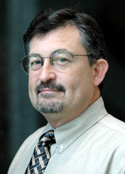
Tennessee House of Representatives, 14th District
Keith Downen, a staff architect at UT, has a major beef with the power structure in Nashville. His objections could be paralleled with those of many Americans who gripe that opulent corporations such as Halliburton have too much influence in Washington. He cites the degradation in Nashville politics as starting with campaign contributors, because “[politicians] are always going to side with their contributors. That’s what always happens, and that’s why special interest groups are so strong.”
Downen points out that many Tennesseans are unaware of who’s funding which candidate in statewide elections. Having delved into politics after his son was killed by a drunk driver a few years ago, Downen is particularly disturbed that his mainstream opponents have accepted campaign money from constituents in the alcohol industry. He cites “contributions to Chris Oldham from DUI defense attorneys and contributions to Parkey Strader from beer and alcohol sellers” as foreboding indications of how they’ll vote on legislation pertaining to alcohol regulations.
Because of his personal tragedy, Downen is particularly passionate about reforming the lobbying system in regard to the alcohol industry. “The way the beer boards hand out beer permits is mandated by laws, but it’s all very liberal,” he says. He charges special interest groups and paid lobbyists with blocking critical legislation to put repeat DUI offenders behind bars. He’s also disgruntled at the lack of a law that holds accountable parents who furnish alcohol to kids.
Downen sees education as another area that begs for reform. Though he’s not clear on the particulars, he weighs in conservatively on the national privatization debate. “We need to transfer responsibility for educating as many students as possible to private organizations and churches that have proven to do a better job than the state in educating our youth,” he states. He suggests a voucher system of some sort to distribute national funding to these private organizations.
Though some may see Downen’s positions as slightly radical, his lack of party affiliation gives him the advantage of not having to answer to anyone. He’s vowed to reject any and all contributions from Political Action Committees (PACS) if he is elected. In fact, another reform on his agenda would be to push for “Conflict of Interest” legislation that would put tighter clamps on PACS’ influence on fellow legislators. “It would prohibit legislators that receive PAC money from participating in any way or voting on issues that effect their special interest sponsor,” Downen says.
Of course, Downen has no delusions that such legislation would gain momentum. “It doesn’t have a chance,” he concedes, “it would be like biting the hand that feeds them.”
—Molly Kincaid
Kyle Phillips
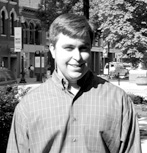
Tennessee House of Representatives, 14th District
These days, it seems most of us just sit around and complain about what’s going on in the world, pointing fingers at a powerful few, whether or not they deserve it. We may even rationalize our collective sloth with the excuse that we cast our vote, but our man or woman lost, so there’s nothing more we can do. Kyle Phillips says that the simple act of voting is not enough. Quite frankly, he thinks we should all get off our butts and do something.
“I’m not afraid to say to the people: wake up, get involved, quit being lazy and shirking your responsibility because that’s the surest way to have more government and loose your liberties.”
Phillips, who currently works in sales at the Whirlpool Corporation, would like to see, above all else, a reduction in the size and power of the government and thus a return of responsibility to the people. “I favor a smaller government that would keep more tax dollars at home,” he says, “because the citizens know better than the government how to spend their money.”
A self-proclaimed conservative independent, Phillips takes a staunchly right-wing position on taxation. “If we can keep taxes low and make good decisions and allow businesses to do what’s best for them; they’ll grow, add jobs, and the tax base will grow. In effect, the existing tax structure will generate more revenue without actually raising taxes.”
Likewise, Phillips was not in favor of the state income tax, but he now thinks of it as a necessary evil due to the excessive budgetary problems. If elected, he would push for major reform in order to address these problems as opposed to continually raising taxes. “I think if we really look at streamlining the government, getting the budget under control, reforming TennCare and other agencies that eat up the budget, the taxes we have in place can support the state of Tennessee,” he assures. With such reform in place, Phillips purports that the income tax would become superfluous and the sales tax may even roll back eventually.
Another component of Phillips’ small government platform is a reduction in governmental regulations in hopes of shrinking its sphere of influence over citizens’ daily lives as well as the economy. “If it came to a choice of regulating something and not regulating it, I tend to lean toward the latter side,” he says. “I’m not one of these that wants to legalize all drugs, gambling and prostitution. I’m not that extreme, but I do think the government plays too heavy a hand in a lot of things that go on now.”
Even when it comes to the environment, which Phillips admits has dire problems in Tennessee, he stands by his penchant for sparse legislation. “There’s a great deal of legislation already in place that’s not being enforced,” he explains. “I think if we enforced what was there, there’s no need to make more legislation.” He goes on to say that the environment is another example of how the people can have a positive effect on state problems. Relying on the concept of supply and demand, Phillips says that if consumers insist on fuel-efficient cars and environmentally safe products, producers will supply them.
Some would accuse Phillips of putting to much faith in the very people he himself calls “lazy.” But he intends to rile people up enough to change that. He says with conviction, “It’s easy to sit around and say, ‘things should be different, shame on our politicians, but we as citizens have a responsibility that we’re not living up to.”
—Molly Kincaid
Umoja Abdul-Ahad
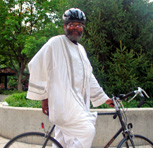
Tennessee House of Representatives, 15th District
It’s difficult to reconcile Umoja Abdul-Ahad, the humble supplicant in the knit cap and flowing white smock who comes to prayer at Muslim Community of Knoxville mosque as many as five times a day, with Umoja, the big guy with the thick dreadlocks and the loud African-print shirts who rails and proselytizes from the front row of East Knoxville public meetings. But they are one and the same, the two sides of this devout Muslim and long-time community activist who is running for the 15th District House of Representatives seat currently held by Joe Armstrong.
Abdul-Ahad is mindful of the dichotomy, and says he tries to keep the centered, spiritual side of his personality at the forefront; his standard greeting on the phone and in voice-mail is “As-Salaamu Alaikum,” which translates from the Arabic as “May the peace of God be with you.”
“The science of God, to me, is about keeping ourselves God-conscious,” says Abdul-Ahad during a moment’s respite after a Thursday mid-afternoon prayer. “It’s hard to say ‘As-Salaamu Alaikum’ to somebody, and then call them some awful name. You have to leave the door open for some kind of humbleness.”
But the more earthly, excitable Umoja always lurks beneath that facade of reverent equanimity, and it is perhaps that Umoja who was ultimately moved to enter the 15th district race.
A region of about 50,000 residents, bounded roughly by Hollywood Boulevard on the West, Harris Road on the East, Buffet Mill Road on the North, and Riverside Drive on the South, the 15th district encompasses some of the most economically disadvantaged portions of Knox County. Abdul-Ahad says his chief impetus came from the city’s initiative to raze the low-income Austin Homes housing project in East Knox in favor of new development, a decision he says will only perpetuate the cycle of need in the inner city.
“I’ve been disappointed in the kind of representation those [Austin Homes] residents have received,” he says. “The decision was based on a lot of erroneous information coming out of KCDC. But for the most part, the African American politicians in the community didn’t do anything.
“When I first heard about it, I prayed about it. I asked God, ‘How can I help?’ Then I went and picked up my petition.”
Abdul-Ahad is no stranger to public service. His previous political involvement includes a stint as state coordinator for Jesse Jackson’s presidential campaign in 1984, and a term as chief of staff for late city councilman Danny Mayfield.
His sometimes ferocious agitations at community meetings, such as those held for the purpose of allocating East Knoxville’s federal Empowerment Zone funding, have been a perpetual thorn in the side of several local officials. At present, he serves as executive director of Project 2000, Inc., a local non-profit community development and volunteer service organization.
“I want to give the citizens an opportunity to make a comparison,” Abdul-Ahad says. “I’ve been a community organizer for 35 years now. My opponent (Armstrong) has been a representative for 16. The state budget has increased by a billion dollars every year since he’s been in there, but you can’t see any of that in our community.”
Make no mistake; Abdul-Ahad’s campaign is not a mere symbolic gesture. Given Mayfield’s improbable victory over council incumbent William Powell in the late 1990s, he believes an upset in the state house race is well within reach.
“I’m not running just as an advocate of something; I’m running to win,” Abdul-Ahad says. “The district has 28,000 voters, and the incumbent only got 1,500 in the primary, so (an upset) is not anything that can’t happen.
“For me, the race is about spirituality. We’ve been moving around in the dark here in Knoxville. It’s about time we moved back into the light.”
—Mike Gibson

October 28, 2004 • Vol 14, No. 44
© 2004 Metro Pulse
|
|